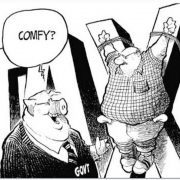The 2011 Election Brought Mixed Outcomes for Ventura

It’s an Ill Wind That Blows Nobody Any Good
—English Proverb
THE VENTURA UNIFIED SCHOOL TAX MEASURE
[MEASURE H – SOUR GRAPES IN BUNCHES]
In the November 2, 2010 election, voters in the City of Ventura were asked by the Ventura Unified School District (VUSD) to approve Measure H, a parcel tax, which if approved, would have imposed a cost of $96 per year per single family residence — unless you were over 60 and claimed an exemption. Those with multiple housing units faced paying far more with no exemption.
The tax proposal failed to receive the 66.67% (2/3rds) majority required for passage. There were 24,491 in favor (59.3%), and 16,767 opposed (40.6%). The VUSD Board of Trustees might want to reflect on this result because the outcome was predictable.
| Measure H | For | Against |
| Votes | 24,491 (59.3%) | 16,767 (40.6%) |
On May 25, 2010, the Dale Scott & Company presented their commissioned survey results for a Parcel Tax Measure to the VUSD Board. The reported poll results were that the Parcel Tax Measure would receive 56.5% support. It was further reported that after a “push/pull” series of 15 more questions with this captive audience, the approval percentage rose to 62%, still 5% short of passage.
The Superintendent’s and proponents cry of foul amounts to sour grapes.
There are many positive steps this board can take notwithstanding this result:
- Negotiate to have the VUSD employees pay a portion of their health care cost(s).
- Reduce non-classroom personnel as much as possible.
- Reflect true health care cost in the annual budget, not costs padded by 11.5%.
The proponents now cry foul about the system .The VUSD superintendent and proponents were quick to point out that the vote was 59.3% for passage, indicating support from a majority of the voters, and from this result feel that the 2/3rds majority vote requirement is unfair and should be changed. That conclusion is ill conceived and would amount to an unreeling budget crisis that would make these current economic times appear minor. The Superintendent’s and proponents cry of foul amounts to sour grapes.
The public reaction to this result should be heard. A letter to the Ventura County Star Editor on Nov. 5 suggested that the 24,491 who voted yes should donate the $96, thus giving the VUSD $2,351,136.
Editors’ Comment:
The idea posited by the November 5th letter writer is a super idea and that should be where the VUSD should focus its next campaign. The question remains—would those same voters contribute to an educational trust fund for defined purposes? Hard not to be cynical and suggest that it is easy to vote for something when you are spending someone else’s hard earned money.
MORE ELECTION STUFF
[TYRANNY OF THE MAJORITY?]
California voters went rogue on November 2nd, bucking the national and Ventura trend toward electing fiscally responsible candidates. Sadly, those working under the Sacramento Capitol dome will behave very much as those who preceded them.
In the Legislature, three-fifths of the members will continue to dance to the tune of their government employee union sponsors. California government workers have become the highest paid in all 50 states, without much effort in electing candidates who will support their requests for ever higher pay and benefits. This will spill over onto the City of Ventura. Count on the Sacramento types to pursue all manner of fiscal mischief.
First the “Ill Wind” for Ventura citizens. The passage of the government employee union sponsored Proposition 25 will have negative consequences for those who pay our state’s bills. Proposition 25 lowers the threshold to approve a budget to a simple majority, down from the two-thirds vote requirement that has been in place since 1933. Now it remains to be seen whether or not lawmakers will try to take the next step and try to impose a myriad of new taxes in the state budget with a simple 51% majority vote. If history is any indicator they will try. Senate President Pro Tem Darrell Steinberg as well as government employee union leaders have stated that reducing the two-thirds vote for the budget is the first of a one-two punch that is designed to soften up taxpayers on the issue of the current requirement or two-thirds vote before taxes can be raised.
| Proposition 22 | For | Against |
| Votes | 5,709,050 (60.7%) | 3,709,292 (39.3%) |
But for Ventura and other municipalities this election has blown in a “lot of good”. Proposition 22, the measure to stop Sacramento from taking City funds and tax revenue in the guise of “borrowing” passed with a yes vote of 5,709,050 (60.7%) and no vote of 3,709,292 (39.3%). This taking by an out of control state bureaucracy has been stopped thanks to the efforts of our City Council, as a member of the California League of Cities, and in particular our own City Councilman, Neal Andrews.
Editors:
B. Alviani K. Corse T. Cook
J. Tingstrom R. McCord
For more information like this, subscribe to our newsletter, Res Publica. Click here to enter your name and email address.






